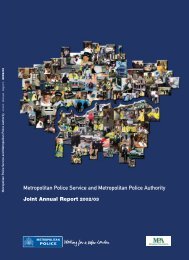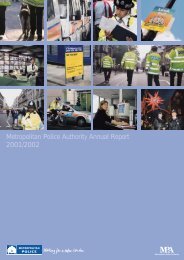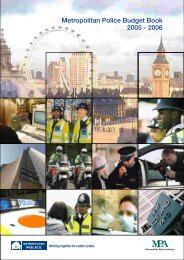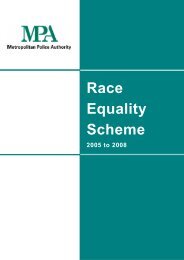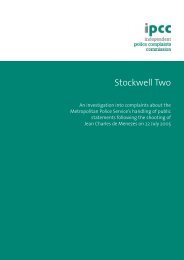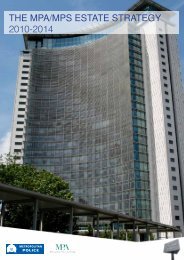Final Report of the Morris Inquiry: The Case for Change
Final Report of the Morris Inquiry: The Case for Change
Final Report of the Morris Inquiry: The Case for Change
Create successful ePaper yourself
Turn your PDF publications into a flip-book with our unique Google optimized e-Paper software.
THE CASE FOR CHANGE<br />
● To identify specific cases upon which it requires a full report from <strong>the</strong> Commissioner,<br />
and <strong>for</strong> <strong>the</strong>se to include live as well as closed cases.<br />
● To give advice or views on <strong>the</strong> conduct or progress <strong>of</strong> a specific case to which <strong>the</strong><br />
Commissioner should be required to have regard; to nominate one or more<br />
Members to give such advice or views on a continuing basis throughout <strong>the</strong> course <strong>of</strong><br />
an individual case.<br />
● To set standards in respect <strong>of</strong> matters such as use <strong>of</strong> mediation, in<strong>for</strong>mal resolution <strong>of</strong><br />
complaints, and restorative conferencing to which <strong>the</strong> Commissioner should be<br />
required to have regard.”<br />
(Submission from Reshard Auladin, Chair <strong>of</strong> <strong>the</strong> MPA’s Pr<strong>of</strong>essional Standards and<br />
Complaints Committee.)<br />
6.27 Lord Harris proposed in his submission that <strong>the</strong> function <strong>of</strong> <strong>the</strong> investigation<br />
<strong>of</strong> complaints within a service should be at “arms length” from <strong>the</strong> service<br />
management and directly accountable to <strong>the</strong> police authority. “Redefining <strong>the</strong><br />
relationship <strong>of</strong> <strong>the</strong> investigating unit to <strong>the</strong> Authority could boost community confidence in <strong>the</strong><br />
complaints process, complementing <strong>the</strong> role <strong>of</strong> <strong>the</strong> MPA.”<br />
6.28 <strong>The</strong> MPA itself acknowledged that this proposal received little support from<br />
those giving evidence to <strong>the</strong> <strong>Inquiry</strong>. <strong>The</strong> Commissioner saw it as potentially being<br />
“political interference”, although <strong>the</strong> MPA, like all police authorities, is not intended to<br />
be a political body. <strong>The</strong> MPA clarified that <strong>the</strong>y were not proposing that police<br />
authorities should have any direct responsibility <strong>for</strong> discipline decisions or functions<br />
and saw <strong>the</strong> proposal as building on <strong>the</strong> “existing convention in police <strong>for</strong>ces that <strong>the</strong><br />
Deputy Chief Constable is <strong>the</strong> discipline authority and responsible <strong>for</strong> <strong>the</strong> operation <strong>of</strong> <strong>the</strong><br />
complaints function.”<br />
6.29 Thus, in respect <strong>of</strong> <strong>the</strong> MPS, <strong>the</strong> MPA’s proposal is that <strong>the</strong> Deputy<br />
Commissioner should have responsibility and accountability <strong>for</strong> <strong>the</strong> direction and<br />
control <strong>of</strong> <strong>the</strong> service relating to <strong>the</strong> investigation <strong>of</strong> complaints and conduct<br />
matters and should report to, and be accountable, to <strong>the</strong> Authority <strong>for</strong> <strong>the</strong><br />
per<strong>for</strong>mance <strong>of</strong> those responsibilities.<br />
6.30 This would leave <strong>the</strong> Commissioner free in <strong>the</strong> role <strong>of</strong> final adjudicator on<br />
individual cases without a conflict <strong>of</strong> responsibilities.<br />
“<strong>The</strong> separation <strong>of</strong> functions, and <strong>the</strong> introduction <strong>of</strong> <strong>the</strong> authority as an independent player,<br />
would serve to increase public and internal confidence in <strong>the</strong> system.”<br />
(Submission from Reshard Auladin, Chair <strong>of</strong> <strong>the</strong> MPA’s Pr<strong>of</strong>essional Standards and<br />
Complaints Committee.)<br />
6.31 We invited <strong>the</strong> Home Office to comment on <strong>the</strong> MPA’s proposal. <strong>The</strong> department’s<br />
view is that <strong>the</strong> current statutory framework enables police authorities to carry out <strong>the</strong>ir<br />
oversight responsibilities and that authorities play a valuable role in asking challenging<br />
questions <strong>of</strong> <strong>the</strong> service. In <strong>the</strong>ir submission to us, <strong>the</strong> Home Office noted <strong>the</strong> MPA’s<br />
view that <strong>the</strong>re was a case <strong>for</strong> “fundamental structural re<strong>for</strong>m to put <strong>the</strong> investigation <strong>of</strong><br />
122


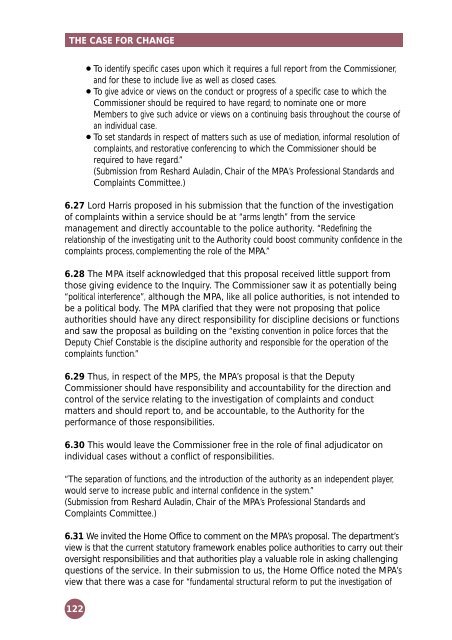
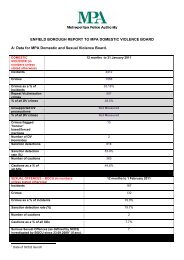
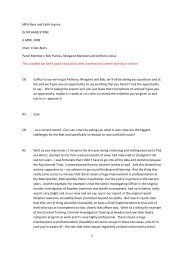
![Appendix 1 [PDF]](https://img.yumpu.com/51078997/1/184x260/appendix-1-pdf.jpg?quality=85)
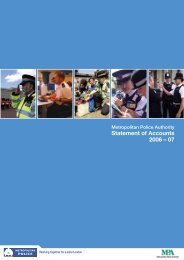
![Transcript of this meeting [PDF]](https://img.yumpu.com/50087310/1/184x260/transcript-of-this-meeting-pdf.jpg?quality=85)
![Street drinking in Hounslow [PDF]](https://img.yumpu.com/49411456/1/184x260/street-drinking-in-hounslow-pdf.jpg?quality=85)

